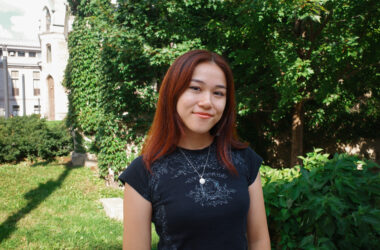I found out that I was pregnant on the same night that the Chicago Cubs won the World Series. The euphoria of my hometown’s victory was accompanied by a devastating plus-sign on a pee stick. I was 17-years-old. The morning after, I called Planned Parenthood and set up an appointment for an abortion the next week. Carrying the clump of cells growing inside of me to term was never an option. While I have always been pro-choice, it’s one I never thought I’d have to make. It was by no means a tortured decision.
Actually getting the abortion was rather simple. In the United States, abortion rights are decided state-by-state, and I was lucky to have been living in New York when I had mine. In Quebec, abortion is legal, free, and available at any time. However, despite its supposed inclusive and liberal campus environment, McGill offers few resources for those seeking an abortion and only recently formed a support group for those who ‘chose.’ My abortion was accessible, but what I didn’t account for was how lonely I’d feel afterwards.
So, three days after Donald Trump’s election, I went to the Planned Parenthood Centre in the Bronx borough of New York City and took a mifepristone pill to kill the fetus, followed by four misoprostol pills to evacuate my uterus. I had never felt more relieved.
The next month involved heavy bleeding, searing cramps, and violent nausea. While my doctor prescribed three weeks of rest and limited activity, I carried on with my life. I went to school, attended track practice and play rehearsals, and picked up more shifts at my movie theatre job. Hearing back from universities, once a monumental phenomenon, seemed minimal compared to my new mental and physical state. With the exception of a few close friends, I never spoke about the abortion to anyone. I was stunned into silence—I felt as though I had made an incredibly mature decision that I was banned from discussing.
I spent a lot of time reading articles and excerpts written by extraordinarily successful women with booming careers and blossoming families. They all said something like “Hey, so, I did a thing when I was 20…” They all seemed to give the same statistic: One in four women will have an abortion by age 45. They all expressed love and empathy for any woman in a position of reproductive vulnerability, especially young women. I noticed that rarely did anyone my own age talk about the choices they’ve made: Abortion seemed to be a topic reserved for middle-aged women already too successful to be hurt by such a confession. There was no space for talking about the process of abortion, its lasting effects, or the simple fact that my body, which I had not yet grown into, was somehow capable of creating another one.
The space to talk about this minor medical procedure is swallowed by politics. Abortion, and the public’s willingness to address it, should not be a partisan issue. Moreover, public acceptance of abortion needs to continue past the procedure itself; one can hold liberal and accepting views regarding abortion, but those views don’t necessarily translate to a willingness to discuss the topic. At 17, I was not remorseful. I did not mourn the loss of my ‘child,’ and, if faced with the same situation today, I would make the same decision immediately. If I could change anything, however, I would seek help ahead of the abortion.
Until this space is created, you can be someone’s support system. Hold their hair back when they’re suffering from morning sickness. Accompany them to their clinic appointment. Let them squeeze your hand when they’re experiencing contractions. Listen to what they have to say—just be there.
Nov. 11, 2016 will always hold meaning for me, but its significance has changed. I am not ashamed of what I did, nor do I feel I did anything extraordinary by choosing to terminate the pregnancy. For me, this date is one of empowerment, of speaking up, and, now, one of telling my story in the hope that someone will feel less alone. On that day, my personal victory felt much more remarkable than the Chicago Cubs’ win.










This is thoughtful and beautifully written. Thank you Caitlin for sharing!
So you had unprotected sex and were shocked that you had to deal with the well-known consequences thereof? Abortion should be there for survivors of rape or pregnancies that endanger the life of the mother. Not as a flippant, “oopsie, I didn’t use a condom/take the pill so let’s just kill the baby!” Disgusting and a shining example of everything wrong with the moral priorities of today’s youth.
Where does it say she was shocked? Where does it say she had unprotected sex? Where does it say carrying the fetus to term would not endanger her life?
It appears, by the evidence, that your moral priority is to browbeat young women barely out of their teens with as little charity of interpretation and as much tendentiousness as one can muster, supporting evidence be damned.
Let’s toss it over to Mencken:
“Moral certainty is always a sign of cultural inferiority. The more uncivilized the man, the surer he is that he knows precisely what is right and what is wrong.”
Obviously she was shocked enough to abort the baby. If she had wanted to/expected to become pregnant then she probably would have carried to to term. And come on, how else does one become pregnant? Condoms and birth control are 99% effective. Odds are unprotected sex was involved.
My priority is to browbeat people who engage in thoughtless sexual behaviour. I have just as much contempt for little boys who think that sleeping around makes them manly. The research shows that casual sex is simply not good for people. 60%, 70%, even 80% of college students report that they regret engaging in hookup culture. It’s toxic and bad preparation for the sort of healthy relationships strong families are built upon.
That’s not what shocked means or implies. The “99 percent” is when used properly: people are fallible and make mistakes. You have no reason to make any of the assumptions you have made, and have now implied a further one that this was casual sex or emblematic of hookup culture. As before, there’s nothing in the text to support that: you invented it from whole cloth. All of which says a great deal more about you and your moral failings than it does about the author.